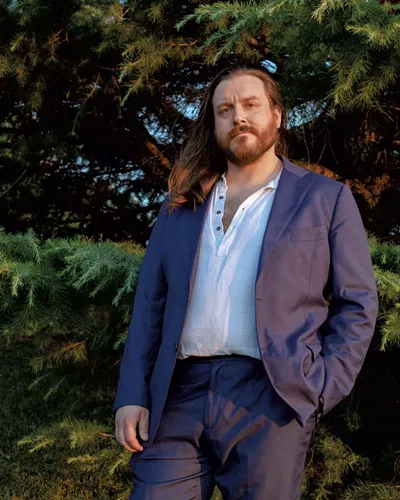If you haven’t heard of the Renaissance singing group Ampersand, you’re in good company. The cohort of six professional singers in their mid-thirties is one of the few in Vermont to specialize in music from that period, which spans roughly 1400 to 1600. The group formed in New York City in 2014 and came to the Green Mountain State in 2022, after one member, countertenor Timothy Parsons, moved to North Ferrisburgh and later settled in Richmond.
Since then, Ampersand have been performing their repertoire’s resonant, interwoven melodies a cappella, with one voice per part, in about three concerts a year at Richmond’s Old Round Church. Five of the members travel to do so, including soprano and Ampersand cofounder Madeline Apple Healey, who is co-artistic director with Parsons and lives in Westchester County, N.Y. The rest come from Boston, New York City and Washington, D.C. All are freelance singers who tour constantly for gigs; these have included performances with top early music groups, such as TENET, and at major venues including Alice Tully Hall in New York City.
This Saturday, April 26, Ampersand will star in Burlington Choral Society‘s ambitious production of Saul, a 1738 oratorio by George Frideric Handel. Led by director Richard Riley, the performance will feature the 50-member chorus, a 20-piece orchestra and five Ampersand soloists.
Riley, 71, has pared the three-hour oratorio down to two, focusing on its story of Saul, the first king of Israel, and his growing jealousy of David, his successor. Parsons, 34, will sing David, and Healey, 36, will sing Saul’s daughter Michal. The other three soloists are part of Ampersand’s network of professional colleagues who fill in when core members have other engagements.
Ampersand are also launching their own new endeavor, called “Polyphonic Spree” — a concert by four core members and 20 community singers on Saturday, May 3, at the Richmond Free Library. The latter group includes some members of the Onion River Chorus, a community chorus in Montpelier also led by Riley and for which Parsons has twice sung as a soloist.
Riley first heard Ampersand at an early Round Church concert.
“I was excited. They represented something that is quite unique in this area,” he recalled. “We’ve got a hell of a lot of choruses, but they were taking on some of the most intricate Renaissance music and doing it at a level that was just thrilling.” (Southern Vermont chamber choir Brattleboro Camerata also specialize in the period, and the Green Mountain Monteverdi Ensemble of Vermont’s repertoire includes it.)
The choral director had been wanting to do Handel’s Saul since hearing it nearly 50 years ago, but the arrival of a countertenor in Vermont suddenly made it feasible. Countertenors sing naturally in the alto range. Riley, who sang as a professional countertenor with Boston Camerata in the 1970s, said that, besides Parsons, he knows of “no other countertenor in Vermont who does high-level solo work.” Parsons earned a bachelor’s degree in classical voice performance and a master’s in choral conducting at the Manhattan School of Music.
As a High Baroque composer, Handel lived a little later than the period in which Ampersand specialize, but he’s “part of this lineage that comes out of our repertoire,” Healey said. On her website, she describes herself as “known for her interpretation of Handel heroines.” She studied voice and music history at Baldwin Wallace College in Ohio and earned a master’s in voice performance and pedagogy at New Jersey’s Westminster Choir College. Healey cofounded Ampersand with Anna C. Lenti, now director of choral activities at Williams College in Massachusetts.
Both singers, who spoke with Seven Days during a joint phone call, waxed rhapsodic about Renaissance music — “It’s amazingly and almost hilariously old,” Parsons said — and Ampersand’s focus on one-voice-per-part singing.
“The magic of this repertoire is how these interdependent melodic lines coalesce and converge with each other,” Parsons continued. While not exactly improv, the notated music’s harmonies elicit a lively interplay during performance that he calls “a spontaneous unfolding.” (Parsons also sings in an improv group in Montpelier once a month, facilitated by Patricia Norton and David Ruffin, that explores music inspired by Bobby McFerrin and Rhiannon of Vocal River.)
Healey explained, “When you’re singing with people who are really plugged in, it’s incredible to see what your colleagues are making in the moment and respond to that.” The dynamic is evident in videos on the Ampersand website of the group singing Renaissance songs in English and Latin.
“Polyphonic Spree” is an opportunity for Ampersand to engage with local singers. “I love coaching people through repertoire,” said Parsons, who won a Vermont Arts Council grant for the project and hopes to make the concert an annual event.
Cheekily named for a choral rock band from 20 years ago, “Polyphonic Spree” is “a nod to the fact that this music is not meant to be kept in a museum,” Healey said. “There’s a punk side of polyphonic writing.” (Any music that involves multiple, independent melodic lines is polyphonic.) A third of the concert will feature Ampersand and the locals singing together; the rest of the program is divided between each group.
The event gives Ampersand a chance to lean into their friendly, inclusive name.
“Maybe this is a little head-in-the-clouds,” Parsons said, but the broader idea of interdependence “is, I think, a healthier thing for our world than ‘Every man is an island.'”

